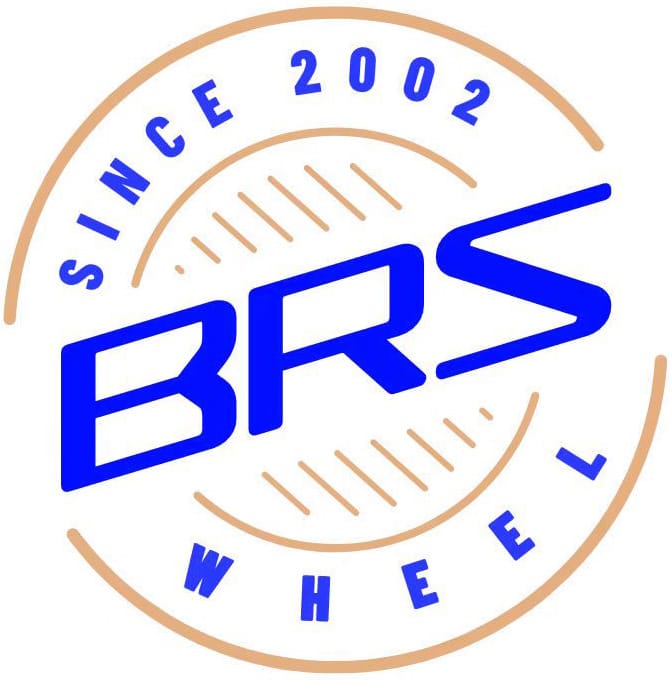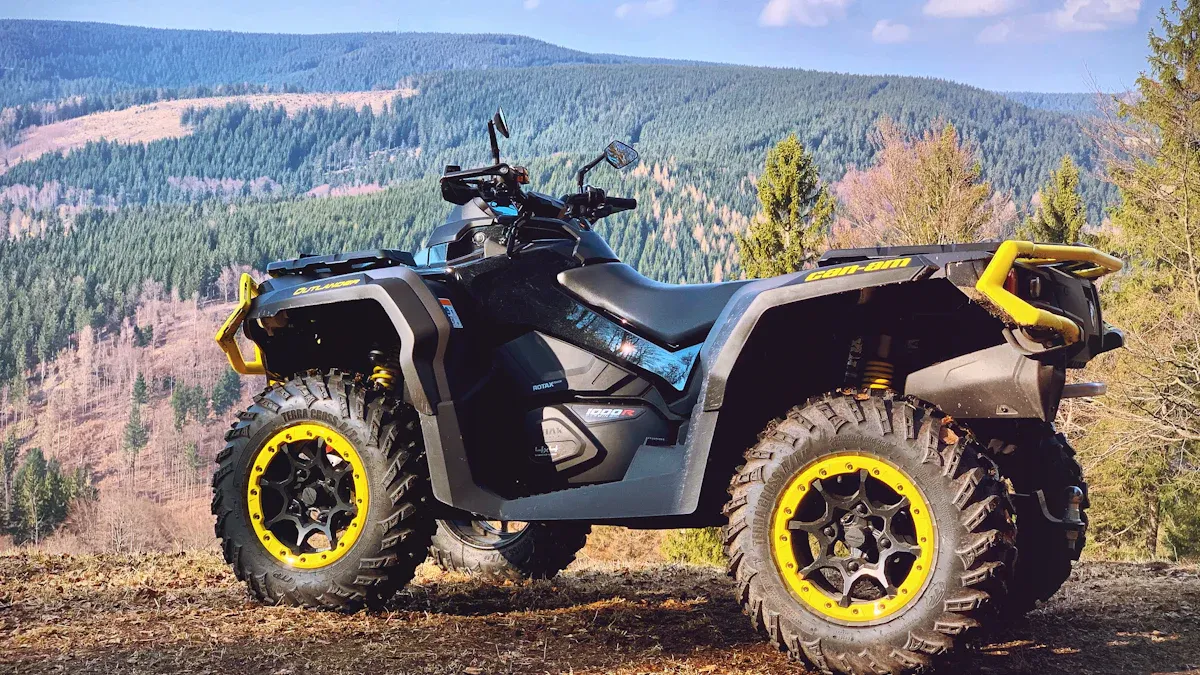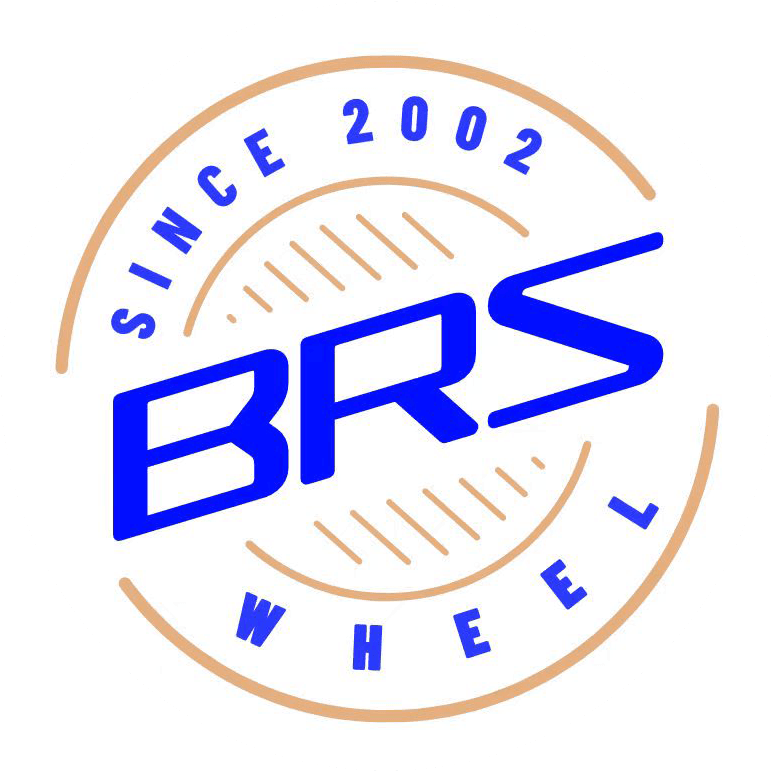
Die Auswahl der richtigen Reifengröße für Ihr 18×7.5 Felge ist entscheidend für die beste Leistung und Sicherheit. Reifen im Breitenbereich von 215 bis 245 passen gut zu dieser Felgengröße. Beliebte Größen sind 225/40R18, 235/40R18 und 245/40R18. Diese Größen bieten ein ausgewogenes Verhältnis zwischen Grip, Handling und Komfort. Eine korrekte Passform stellt sicher, dass Ihre Reifen effizient funktionieren und mit Ihren Felgen kompatibel bleiben. Eine falsche Dimensionierung kann zu verminderter Stabilität oder ungleichmäßigem Verschleiß führen. Achten Sie stets auf die richtige Reifengröße, um optimale Fahrbedingungen zu gewährleisten.
Wichtigste Erkenntnisse
- Wählen Sie Reifengrößen zwischen 215 und 245 für optimale Leistung auf 18×7,5-Felgen, wobei 225/40R18 für die meisten Fahrer eine ausgewogene Option darstellt.
- Verstehen Angaben zur Reifengröße-Breite, Querschnittsverhältnis und Felgendurchmesser - ist entscheidend für die richtige Passform und Sicherheit.
- Breitere Reifen verbessern den Grip und die Stabilität, erfordern aber möglicherweise Anpassungen an der Aufhängung Ihres Fahrzeugs, um Probleme mit der Bodenfreiheit zu vermeiden.
- Schauen Sie immer in der Betriebsanleitung Ihres Fahrzeugs nach, welche Reifengrößen vom Hersteller empfohlen werden, um Sicherheit und Leistung zu gewährleisten.
- Eine falsche Reifendimensionierung kann zu Problemen beim Fahrverhalten, ungleichmäßigem Verschleiß und möglichen Schäden an den Komponenten Ihres Fahrzeugs führen.
- Eine regelmäßige Wartung, einschließlich der Überprüfung des Reifendrucks und der Ausrichtung der Reifen, ist für die Verlängerung der Lebensdauer der Reifen und die Gewährleistung der Sicherheit unerlässlich.
- Wenden Sie sich an einen Reifenexperten, wenn Sie sich über die Kompatibilität der Reifen unsicher sind, um kostspielige Fehler zu vermeiden und Ihr Fahrerlebnis zu verbessern.
Verständnis der Spezifikationen für die Reifengröße

Bei der Auswahl der richtigen Reifen für Ihre 18×7,5-Felge ist es wichtig, die Spezifikationen der Reifengröße zu kennen. Jeder Teil der Code der Reifengröße liefert wichtige Informationen über die Dimensionen und Leistungsmerkmale des Reifens. Schauen wir uns das Schritt für Schritt an.
Aufschlüsselung des Reifengrößencodes
Der Code der Reifengröße, oft auf der Seitenwand zu finden des Reifens, besteht aus einer Kombination von Buchstaben und Zahlen. Hier erfahren Sie, was die einzelnen Komponenten bedeuten:
Breite: Maß in Millimetern für die Breite des Reifens von Seitenwand zu Seitenwand.
Die erste Zahl im Reifengrößencode steht für die Breite des Reifens in Millimetern. Bei einer Größe wie 225/40R18 bedeutet "225" zum Beispiel, dass der Reifen 225 Millimeter breit ist. Dieses Maß ist von entscheidender Bedeutung, denn es bestimmt, wie gut der Reifen auf die Felge passt und wie viel Kontakt er mit der Straße hat. Die richtige Breite sorgt für Stabilität und optimale Leistung.
Querschnittsverhältnis: Die Höhe der Seitenwand im Verhältnis zur Breite des Reifens.
Das Seitenverhältnis folgt auf den Schrägstrich im Größencode. Es wird in Prozent ausgedrückt. Zum Beispiel bedeutet die "40" bei der Größe 225/40R18, dass die Seitenwandhöhe 40% der Breite des Reifens. Eine geringere Streckung führt in der Regel zu einem besseren Handling und einem sportlicheren Erscheinungsbild, während eine höhere Streckung mehr Dämpfung für ein ruhigeres Fahrverhalten bietet.
Felgendurchmesser: Der Durchmesser des Rades, auf das der Reifen passen soll, gemessen in Zoll.
Die letzte Zahl im Code gibt den Felgendurchmesser in Zoll an. Im Beispiel 225/40R18 gibt die "18" an, dass der Reifen für eine 18-Zoll-Felge ausgelegt ist. Dieses Maß gewährleistet die Kompatibilität zwischen Reifen und Felge, die für die Sicherheit und Leistung entscheidend ist.
Zusätzliche Kennzeichnungen: Tragfähigkeitsindex, Geschwindigkeitsindex und andere Spezifikationen.
Neben der grundlegenden Größenangabe enthalten Reifen oft zusätzliche Kennzeichnungen. Der Tragfähigkeitsindex gibt das maximale Gewicht an, das der Reifen tragen kann, während die Geschwindigkeitsangabe die Höchstgeschwindigkeit angibt, die der Reifen sicher bewältigen kann. Diese Angaben helfen Ihnen bei der Auswahl eines Reifens, der den Anforderungen und Fahrbedingungen Ihres Fahrzeugs entspricht.
Warum Angaben zur Reifengröße wichtig sind
Die Angaben zur Reifengröße sind mehr als nur Zahlen; sie wirken sich direkt auf die Leistung und Sicherheit Ihres Fahrzeugs aus. Hier erfahren Sie, warum sie wichtig sind:
Sorgt für den richtigen Sitz auf der Felge.
Die Wahl der richtigen Reifengröße gewährleistet einen sicheren Sitz auf Ihrer 18×7,5-Felge. Ein zu schmaler oder zu breiter Reifen kann das Fahrverhalten und die Stabilität beeinträchtigen. Die richtige Passform verhindert auch Probleme wie Reifenrutschen oder ungleichmäßige Abnutzung.
Beeinflusst die Leistung, die Sicherheit und den Kraftstoffverbrauch von Fahrzeugen.
Die richtige Reifengröße hat Einfluss darauf, wie sich Ihr Fahrzeug auf der Straße verhält. Sie wirkt sich auf Traktion, Bremsen und Kurvenverhalten aus. Außerdem kann die richtige Größe die Kraftstoffeffizienz verbessern, indem sie den Rollwiderstand verringert. Eine falsche Größe kann hingegen zu schlechter Leistung und erhöhtem Kraftstoffverbrauch führen. Durch das Verständnis dieser Reifendatenkönnen Sie fundierte Entscheidungen bei der Auswahl von Reifen für Ihre 18×7,5-Felge treffen.
Wenn Sie diese Spezifikationen kennen, können Sie fundierte Entscheidungen bei der Auswahl von Reifen für Ihre 18×7,5-Felge treffen. Beziehen Sie sich immer auf den Reifengrößencode und berücksichtigen Sie, wie jedes Element zur Gesamtleistung und Sicherheit Ihres Fahrzeugs beiträgt.
Empfohlener Reifengrößenbereich für 18×7,5-Felgen

Um die richtige Reifengröße für Ihre 18×7,5-Felge auszuwählen, müssen Sie die Bandbreite der kompatiblen Optionen kennen. Reifen, die in den empfohlenen Bereich fallen, gewährleisten eine korrekte Passform, verbessern die Leistung und sorgen für Sicherheit. Lassen Sie uns die Mindest- und Höchstgrößen sowie die idealen Optionen für ein ausgewogenes Verhältnis zwischen Komfort und Leistung untersuchen.
Minimale und maximale kompatible Größen
Minimum: 215/40R18 - Schmälere Reifen können das Fahrverhalten und die Sicherheit beeinträchtigen.
Die kleinste empfohlene Größe für eine 18×7,5-Felge ist 215/40R18. Diese Größe bietet ein schmaleres Profil, was den Rollwiderstand verringern und die Kraftstoffeffizienz leicht verbessern kann. Schmalere Reifen können jedoch das Fahrverhalten beeinträchtigen, insbesondere in scharfen Kurven oder bei Nässe. Außerdem bieten sie weniger Kontakt zur Straße, was sich auf die Traktion und Stabilität auswirken kann. Wenn Sie Wert auf Praktikabilität und Alltagstauglichkeit legen, ist diese Reifengröße vielleicht die richtige Wahl, aber es ist wichtig, die Nachteile abzuwägen.
Maximal: 245/40R18 - Breitere Reifen können Probleme mit der Bodenfreiheit oder ungleichmäßigen Verschleiß verursachen.
Am oberen Ende des Spektrums stellt die Größe 245/40R18 die breiteste Reifengröße dar, die mit einer 18×7,5-Felge kompatibel ist. Breitere Reifen bieten eine größere Kontaktfläche mit der Straße und verbessern die Haftung und Stabilität. Dies macht sie zu einer ausgezeichneten Wahl für leistungsorientiertes Fahren oder anspruchsvolle Wetterbedingungen wie Regen oder Schnee. Breitere Reifen können jedoch zu Problemen mit der Bodenfreiheit führen, insbesondere wenn Ihr Fahrzeug einen engen Radkasten hat. Außerdem können sie sich ungleichmäßig abnutzen, wenn sie nicht richtig ausgerichtet oder eingestellt sind. Prüfen Sie immer die technischen Daten Ihres Fahrzeugs, bevor Sie sich für diese Größe entscheiden.
Ideale Reifengrößen für Leistung und Komfort
225/40R18: Eine ausgewogene Option für die meisten Fahrzeuge.
Die 225/40R18 Größe schlägt einen perfekten Gleichgewicht zwischen Leistung und Zweckmäßigkeit. Er passt gut auf eine 18×7,5-Felge und bietet zuverlässiges Handling, gute Traktion und ein komfortables Fahrverhalten. Viele Fahrer bevorzugen diese Größe, weil sie bei verschiedenen Reifenmarken weit verbreitet ist, was es einfacher macht, hochwertige Optionen zu wettbewerbsfähigen Preisen zu finden. Wenn Sie auf der Suche nach einer vielseitigen Reifengröße sind, die sowohl für den Stadtverkehr als auch für gelegentliches sportliches Fahren geeignet ist, ist dies eine ausgezeichnete Wahl.
235/40R18: Etwas breiter für mehr Grip und Stabilität.
Für diejenigen, die mehr Grip und Stabilität suchen, ist die Größe 235/40R18 eine gute Option. Das etwas breitere Profil vergrößert die Aufstandsfläche des Reifens, was die Kurvenfahrt und die Bremsleistung verbessert. Diese Größe ist ideal für Fahrer, die ein sportlicheres Fahrgefühl mögen oder häufig auf Autobahnen fahren. Sie bietet auch eine spürbare Verbesserung der Stabilität bei Hochgeschwindigkeitsmanövern. Er kostet zwar etwas mehr als die schmaleren Varianten, aber die zusätzlichen Leistungsvorteile sind eine Überlegung wert.
245/40R18: Am besten für leistungsorientiertes Fahren geeignet, kann aber Anpassungen erfordern.
Wenn Leistung Ihre oberste Priorität ist, liefert die Größe 245/40R18 außergewöhnliche Ergebnisse. Die größere Breite verbessert die Traktion und eignet sich daher für aggressive Fahrstile oder Fahrzeuge mit leistungsstarken Motoren. Diese Größe ist besonders vorteilhaft für Rennstreckentage oder schwierige Straßenverhältnisse. Es kann jedoch sein, dass Sie die Aufhängung oder die Ausrichtung Ihres Fahrzeugs anpassen müssen, um Probleme mit dem Spielraum zu vermeiden. Außerdem könnte der erhöhte Rollwiderstand die Kraftstoffeffizienz leicht beeinträchtigen. Ziehen Sie diese Größe in Betracht, wenn Sie bereit sind, für maximale Leistung kleinere Änderungen vorzunehmen.
Profi-Tipp: Konsultieren Sie immer die Betriebsanleitung Ihres Fahrzeugs oder einen Reifenspezialisten Ihres Vertrauens, bevor Sie eine Reifengröße auswählen. Die Kompatibilität mit Ihrer 18×7,5-Felge und den Fahrzeugspezifikationen ist entscheidend für Sicherheit und Leistung.
Wenn Sie das Spektrum der verfügbaren Reifengrößen kennen, können Sie eine fundierte Entscheidung treffen, die Ihren Fahrbedürfnissen und Vorlieben gerecht wird. Egal, ob Sie Komfort, Leistung oder eine Mischung aus beidem bevorzugen, es gibt eine Reifengröße in diesem Bereich, die perfekt für Ihre 18×7,5-Felge ist.
Faktoren, die bei der Wahl der Reifengröße für 18×7,5-Felgen zu berücksichtigen sind
Bei der Auswahl der richtigen Reifengröße für Ihre 18×7,5-Felge spielen mehrere Faktoren eine Rolle. Diese Überlegungen stellen sicher, dass Ihre Wahl mit Ihren Fahrbedürfnissen, Fahrzeugspezifikationen und persönlichen Vorlieben übereinstimmt. Im Folgenden werden die wichtigsten Aspekte erläutert, die Sie beachten sollten.
Fahrbedingungen
Die ideale Reifengröße wird maßgeblich durch die Fahrumgebung beeinflusst. Unterschiedliche Bedingungen erfordern spezifische Reifeneigenschaften, um Leistung und Sicherheit zu optimieren.
Stadt und Landstraße: Entscheiden Sie sich für eine Standardgröße wie 225/40R18 für Komfort und Kraftstoffeffizienz.
Für das tägliche Pendeln oder lange Autobahnfahrten ist eine Standardgröße wie 225/40R18 gut geeignet. Diese Größe bietet eine ausgewogene Kombination aus Komfort und Kraftstoffeffizienz. Die geringere Breite verringert den Rollwiderstand, was zu einem niedrigeren Benzinverbrauch beiträgt. Außerdem sorgt sie für eine ruhige Fahrt auf Stadtstraßen und Autobahnen, was sie für die meisten Fahrer zu einer praktischen Wahl macht.
Leistungsorientiertes Fahren: Breitere Reifen wie 235/40R18 oder 245/40R18 für besseren Grip und besseres Handling.
Wenn Sie gerne rasant fahren oder häufig auf kurvigen Straßen unterwegs sind, sind breitere Reifen wie 235/40R18 oder 245/40R18 die bessere Wahl. Diese Größen bieten eine größere Aufstandsfläche und verbessern die Haftung und Stabilität in scharfen Kurven oder bei Hochgeschwindigkeitsmanövern. Breitere Reifen verbessern auch die Bremsleistung, was für leistungsorientiertes Fahren entscheidend ist. Stellen Sie jedoch sicher, dass Ihr Fahrzeug diese Größen ohne Probleme aufnehmen kann.
Experteneinblick: Nach Ansicht der Experten von Bridgestone Tire, richtige Reifengröße ist für die Aufrechterhaltung von Sicherheit und Leistung unerlässlich. Breitere Reifen können das Fahrverhalten verbessern, können aber den Kraftstoffverbrauch leicht beeinträchtigen.
Ästhetische Vorlieben
Die Reifengröße wirkt sich auch auf die optische Attraktivität Ihres Fahrzeugs aus. Die richtige Wahl kann das Gesamtbild verbessern und gleichzeitig die Funktionalität erhalten.
Breitere Reifen können das Erscheinungsbild des Fahrzeugs verbessern, erfordern aber möglicherweise Änderungen.
Breitere Reifen, wie z. B. 245/40R18, verleihen Ihrem Fahrzeug ein aggressiveres und sportlicheres Aussehen. Sie füllen den Radkasten aus und sorgen für ein kühnes und dynamisches Aussehen. Diese Reifen können jedoch Anpassungen an der Aufhängung oder der Ausrichtung erfordern, um ein Reiben am Radkasten zu vermeiden. Wenden Sie sich immer an einen Fachmann, bevor Sie Änderungen vornehmen, um die Kompatibilität sicherzustellen.
Schmalere Reifen sehen zwar weniger aggressiv aus, sind aber für das tägliche Fahren praktisch.
Schmalere Reifen, wie 215/40R18 oder 225/40R18, bieten ein dezenteres Erscheinungsbild. Sie haben zwar nicht die gleiche optische Wirkung wie breitere Optionen, sind aber für den täglichen Gebrauch sehr praktisch. Diese Größen sind leichter zu montieren und zu warten und eignen sich daher ideal für Fahrer, die der Funktionalität den Vorzug vor der Ästhetik geben.
Empfehlungen der Fahrzeughersteller
Bei der Wahl der Reifengröße ist es wichtig, die Richtlinien des Herstellers zu beachten. Diese Empfehlungen dienen dazu, optimale Leistung und Sicherheit zu gewährleisten.
Schauen Sie immer in der Betriebsanleitung nach oder fragen Sie den Hersteller nach den empfohlenen Größen.
In der Betriebsanleitung Ihres Fahrzeugs finden Sie die empfohlenen Reifengrößen für Ihr spezielles Modell. Diese Größen wurden vom Hersteller getestet und genehmigt, um die beste Leistung zu erzielen. Die Einhaltung dieser Richtlinien gewährleistet die ordnungsgemäße Montage auf Ihrer 18×7,5-Felge und bewahrt die Integrität des Fahrzeugdesigns.
Abweichungen von den Empfehlungen können zum Erlöschen von Garantien führen oder die Leistung beeinträchtigen.
Die Verwendung einer Reifengröße, die nicht den Empfehlungen des Herstellers entspricht, kann unbeabsichtigte Folgen haben. So kann die Garantie Ihres Fahrzeugs erlöschen oder das Fahrverhalten, die Kraftstoffeffizienz und die Leistung des Antriebsstrangs beeinträchtigt werden. Die Experten von Ed Kenley Ford betonen die Bedeutung von Beratung durch einen Mechaniker des Vertrauens bevor Sie auf eine andere Reifengröße wechseln. Dieser Schritt stellt sicher, dass Ihre Wahl mit den Fähigkeiten und dem Verwendungszweck Ihres Fahrzeugs übereinstimmt.
Wenn Sie diese Faktoren berücksichtigen, können Sie getrost eine Reifengröße wählen, die Ihren Anforderungen entspricht. Ganz gleich, ob Sie Wert auf Komfort, Leistung oder Ästhetik legen, die Kenntnis dieser Aspekte wird Ihnen helfen, eine fundierte Entscheidung für Ihre 18×7,5-Felge zu treffen.
Folgen der Wahl der falschen Reifengröße für 18×7,5-Felgen
Die Wahl der falschen Reifengröße für Ihre 18×7,5-Felge kann zu einer Reihe von Problemen führen, die die Leistung, Sicherheit und Langlebigkeit Ihres Fahrzeugs beeinträchtigen. Wenn Sie diese Konsequenzen verstehen, können Sie fundierte Entscheidungen treffen und kostspielige Fehler vermeiden.
Handhabung und Sicherheitsaspekte
Zu breite oder zu schmale Reifen können das Lenkverhalten und die Stabilität beeinträchtigen.
Die Verwendung von Reifen, die entweder zu breit oder zu schmal für Ihre 18×7,5-Felge sind, kann das Fahrverhalten Ihres Fahrzeugs beeinträchtigen. Schmale Reifen verringern die Kontaktfläche mit der Straße, was die Haftung beeinträchtigt und die Lenkung weniger reaktionsschnell macht. Andererseits können zu breite Reifen bei scharfen Kurven oder plötzlichen Fahrmanövern zu Instabilität führen. Beide Szenarien erhöhen das Unfallrisiko, insbesondere bei schwierigen Fahrbedingungen.
Tatsache: Nach Angaben der Coker Tire Blog, ungeeignete Reifengrößen die Fahreigenschaften eines Fahrzeugs erheblich verändern, was zu einem unkomfortablen und potenziell unsicheren Fahrverhalten führt.
Falsche Größen können zu einer verminderten Traktion bei Nässe oder Glätte führen.
Die Traktion spielt eine entscheidende Rolle, wenn es darum geht, die Kontrolle über das Fahrzeug zu behalten, insbesondere auf rutschigem Untergrund. Reifen, die nicht richtig auf die Felge passen, können ihr Gewicht nicht gleichmäßig verteilen, was ihre Fähigkeit, auf der Straße zu haften, verringert. Dieses Problem tritt vor allem bei Nässe oder Eis auf, wo schon ein geringer Traktionsverlust zu gefährlichem Schleudern oder Aquaplaning führen kann.
Experteneinblick: Die Yokohama-Reifen Kanada Blog unterstreicht, dass Reifengröße wirkt sich direkt auf die Sicherheit ausEine falsche Dimensionierung erhöht die Wahrscheinlichkeit einer verminderten Traktion und eines beeinträchtigten Fahrverhaltens.
Erhöhte Abnutzung und Verschleiß
Ein ungleichmäßiger Reifenverschleiß kann die Folge einer unsachgemäßen Montage sein.
Wenn ein Reifen nicht richtig auf Ihre Felge passt, nutzt er sich mit der Zeit ungleichmäßig ab. Ein zu schmaler Reifen kann beispielsweise in der Mitte übermäßig abgenutzt sein, während ein breiterer Reifen an den Rändern abgenutzt ist. Ein ungleichmäßiger Verschleiß verkürzt die Lebensdauer Ihrer Reifen, so dass Sie sie häufiger austauschen müssen und Ihre Wartungskosten insgesamt steigen.
Die Komponenten der Aufhängung können zusätzlich belastet werden.
Falsche Reifengrößen belasten auch das Aufhängungssystem Ihres Fahrzeugs übermäßig. Zu breite oder zu schmale Reifen verändern die Ausrichtung und das Gleichgewicht Ihres Fahrzeugs, so dass die Aufhängungskomponenten mehr arbeiten müssen, um die Stabilität zu erhalten. Mit der Zeit kann diese zusätzliche Belastung zu einem vorzeitigen Verschleiß von Teilen wie Stoßdämpfern, Federbeinen und Querlenkern führen.
Profi-Tipp: Halten Sie sich an die vom Hersteller empfohlene Reifengröße, um unnötigen Verschleiß von Reifen und Federung zu vermeiden. Wie bereits von Bridgestone-Reifen, optimale Leistung wird erreicht, wenn Sie die richtige Reifengröße verwenden.
Mögliche Beschädigung des Fahrzeugs
Probleme mit dem Spielraum können dazu führen, dass das Fahrzeug am Radkasten oder an der Aufhängung reibt.
Breitere Reifen sehen zwar ansprechend aus, verursachen aber oft Probleme mit der Bodenfreiheit. Wenn der Reifen den verfügbaren Platz im Radkasten überschreitet, kann er an der Aufhängung oder Karosserie Ihres Fahrzeugs reiben. Diese Reibung beschädigt nicht nur den Reifen, sondern verschleißt auch die betroffenen Teile Ihres Fahrzeugs, was zu teuren Reparaturen führt.
Falsche Größen können die Felge oder den Reifen mit der Zeit beschädigen.
Die Verwendung der falschen Reifengröße kann Ihre 18×7,5-Felge ebenfalls beschädigen. Ein zu schmaler Reifen bietet möglicherweise keine ausreichende Unterstützung und erhöht das Risiko, dass sich die Felge unter Druck verbiegt oder bricht. Umgekehrt kann ein zu breiter Reifen eine übermäßige Kraft auf die Felge ausüben und strukturelle Schäden verursachen. Beide Szenarien beeinträchtigen die Integrität Ihrer Räder und verkürzen deren Lebensdauer.
Das Wichtigste zum Mitnehmen: Die Ed Kenley Ford Blog darauf hin, dass ein Abweichen von der empfohlenen Reifengröße zu langfristigen Schäden an Ihrem Fahrzeug, einschließlich der Felgen und Reifen, führen kann.
Wenn Sie diese potenziellen Folgen verstehen, können Sie nachvollziehen, warum die Wahl der richtigen Reifengröße für Ihre 18×7,5-Felge so wichtig ist. Die richtige Dimensionierung sorgt dafür, dass Ihr Fahrzeug sicher und effizient fährt, und schützt gleichzeitig seine Komponenten vor unnötigem Verschleiß und Schäden.
FAQs
Wenn es darum geht, die beste Reifengröße für Ihre 18×7,5-Felgen auszuwählen, haben Sie vielleicht einige Fragen. Im Folgenden finden Sie Antworten auf häufig gestellte Fragen, die Ihnen helfen können, eine fundierte Entscheidung zu treffen.
1. Was ist der breiteste Reifen, den ich auf 18×7,5-Felgen verwenden kann?
Die breiteste empfohlene Reifengröße für 18×7,5-Felgen ist 245/40R18. Diese Größe bietet hervorragenden Grip und Stabilität, insbesondere bei leistungsorientiertem Fahren. Breitere Reifen können jedoch abhängig von der Aufhängung Ihres Fahrzeugs oder dem Platz im Radkasten Probleme mit der Bodenfreiheit verursachen. Prüfen Sie immer die technischen Daten Ihres Fahrzeugs oder fragen Sie einen Fachmann, bevor Sie sich für die breiteste Größe entscheiden.
Profi-Tipp: Wenn Sie breitere Reifen in Erwägung ziehen, achten Sie darauf, dass die Felgen die richtige Einpresstiefe haben, damit sie nicht an der Aufhängung oder Karosserie scheuern. Eine Felge mit einer Einpresstiefe von zum Beispiel +38 bis +40 funktioniert oft gut mit breiteren Reifen.
2. Kann ich schmalere Reifen wie 205/40R18 auf 18×7,5-Felgen verwenden?
Obwohl 205/40R18-Reifen technisch gesehen passen, sind sie nicht ideal für 18×7,5-Felgen. Schmalere Reifen verringern die Aufstandsfläche auf der Straße, was das Fahrverhalten, die Traktion und die allgemeine Sicherheit beeinträchtigen kann. Für eine optimale Leistung sollten Sie sich an die empfohlene Mindestbreite von 215 mm halten.
Das Wichtigste zum Mitnehmen: Die Verwendung von Reifen, die schmaler als 215 mm sind, auf 18×7,5-Felgen kann zu ungleichmäßigem Verschleiß und verminderter Stabilität führen, insbesondere bei Kurvenfahrten oder Nässe.
3. Woher weiß ich, ob eine Reifengröße für mein Fahrzeug geeignet ist?
Um festzustellen, ob eine Reifengröße für Ihr Fahrzeug geeignet ist, gehen Sie folgendermaßen vor:
- Schauen Sie in der Betriebsanleitung nach: Im Handbuch sind die vom Hersteller empfohlenen Reifengrößen für Ihr Fahrzeug aufgeführt.
- Überprüfen Sie die aktuellen Reifen: Sehen Sie sich den Größencode auf der Seitenwand Ihrer vorhandenen Reifen an.
- Wenden Sie sich an einen Fachmann: Ein Reifenspezialist kann die Kompatibilität auf der Grundlage der Aufhängung Ihres Fahrzeugs, des Platzes im Radkasten und des Verwendungszwecks bestätigen.
Experteneinblick: Viele Autofahrer, die eine Aufrüstung planen, z. B. auf Ford 18×7,5 Tremor-Räder, stellen zunächst die Kompatibilität sicher, indem sie sich von Fachleuten beraten lassen oder ihr Fahrwerk anpassen.
4. Beeinträchtigt ein Wechsel der Reifengröße die Leistung meines Fahrzeugs?
Ja, ein Wechsel der Reifengröße kann sich in mehrfacher Hinsicht auf die Leistung Ihres Fahrzeugs auswirken:
- Handhabung: Breitere Reifen verbessern die Bodenhaftung und das Kurvenverhalten, können aber die Kraftstoffeffizienz verringern.
- Komfort: Reifen mit einem höheren Querschnittsverhältnis bieten ein ruhigeres Fahrverhalten, während niedrigere Verhältnisse das Handling verbessern.
- Genauigkeit des Tachometers: Größere oder kleinere Reifendurchmesser können dazu führen, dass Ihr Tachometer falsche Werte anzeigt.
Tatsache: Reifenexperten zufolge können selbst kleine Änderungen der Reifengröße die Dynamik Ihres Fahrzeugs verändern. Achten Sie darauf, dass Sie immer innerhalb des empfohlenen Bereichs für Ihre 18×7,5-Felgen bleiben.
5. Muss ich meine Federung anpassen, wenn ich breitere Reifen wähle?
In einigen Fällen, ja. Breitere Reifen wie 245/40R18 können Anpassungen an der Aufhängung oder der Ausrichtung erfordern, um Probleme mit der Bodenfreiheit zu vermeiden. Zum Beispiel können Fahrer, die ein Upgrade auf Ford Tremor-Felgen Häufig werden sie mit einstellbaren Stoßdämpfern, wie z. B. Eibach-Federbeinen, kombiniert, um die richtige Passform und Leistung zu gewährleisten.
Profi-Tipp: Wenn Sie Änderungen an der Aufhängung planen, sollten Sie diese vor der Auswahl neuer Reifen durchführen. Dadurch wird sichergestellt, dass die Reifen perfekt zu Ihrem eingestellten Setup passen.
6. Wie pflege ich meine Reifen, um ihre Langlebigkeit zu gewährleisten?
Eine ordnungsgemäße Wartung verlängert die Lebensdauer Ihrer Reifen und sorgt für gleichbleibende Leistung. Befolgen Sie diese Tipps:
- Prüfen Sie regelmäßig den Reifendruck: Reifen mit zu niedrigem oder zu hohem Luftdruck verschleißen ungleichmäßig und verringern die Kraftstoffeffizienz.
- Lassen Sie die Reifen alle 5.000-7.500 Meilen rotieren: Die Rotation fördert den gleichmäßigen Verschleiß aller Reifen.
- Prüfen Sie auf Schäden: Achten Sie auf Schnitte, Einstiche oder Beulen, die die Sicherheit beeinträchtigen könnten.
- Räder ausrichten und auswuchten: Falsch ausgerichtete Räder verursachen ungleichmäßigen Verschleiß und beeinträchtigen das Fahrverhalten.
Das Wichtigste zum Mitnehmen: Eine regelmäßige Wartung verlängert nicht nur die Lebensdauer der Reifen, sondern erhöht auch ihre Sicherheit und Leistungsfähigkeit.
7. Kann ich verschiedene Reifengrößen an meinem Fahrzeug kombinieren?
Das Mischen von Reifengrößen wird nicht empfohlen. Unterschiedliche Größen können das Gleichgewicht, das Fahrverhalten und die Bremsleistung Ihres Fahrzeugs beeinträchtigen. Verwenden Sie immer dieselbe Reifengröße und denselben Reifentyp auf allen vier Rädern, es sei denn, der Hersteller Ihres Fahrzeugs schreibt etwas anderes vor.
Expertenrat: Einheitliche Reifengrößen sorgen für gleichmäßigen Verschleiß und erhalten die Integrität des Antriebsstrangs Ihres Fahrzeugs.
8. Worauf sollte ich bei der Wahl der Reifengröße achten?
Achten Sie bei der Auswahl der Reifengröße für Ihre 18×7,5-Felgen auf folgende Punkte:
- Sicherheit: Vergewissern Sie sich, dass der Reifen sicher sitzt und eine ausreichende Traktion bietet.
- Leistung: Wählen Sie eine Größe, die zu Ihrem Fahrstil und Ihren Bedingungen passt.
- Empfehlungen des Herstellers: Halten Sie sich an die im Benutzerhandbuch angegebenen Größen, um Garantieprobleme zu vermeiden.
Letzter Gedanke: Die richtige Reifengröße bietet ein ausgewogenes Verhältnis zwischen Sicherheit, Leistung und Komfort. Lassen Sie sich immer von einem Fachmann beraten, wenn Sie sich bei Ihrer Wahl nicht sicher sind.
Wenn Sie diese häufig gestellten Fragen beantworten, können Sie die beste Reifengröße für Ihre 18×7,5-Felgen auswählen. Eine gründliche Recherche und fachkundige Beratung gewährleisten, dass Ihre Reifen optimale Leistung und Sicherheit bieten.
Die Auswahl der richtige Reifengröße für Ihre 18×7,5-Felge ist wichtig, um Sicherheit, Leistung und Haltbarkeit zu gewährleisten. Größen wie 225/40R18 bis 245/40R18 bieten eine zuverlässige Auswahl, wobei 235/40R18 für die meisten Fahrer eine vielseitige Wahl ist. Beurteilen Sie immer Ihre Fahrbedingungen, befolgen Sie Herstellerempfehlungenund berücksichtigen Sie bei Ihrer Entscheidung Ihre persönlichen Vorlieben. Falsche Größenangaben können Handhabung und Sicherheit gefährdenEs wird daher dringend empfohlen, einen Fachmann zu konsultieren oder im Handbuch Ihres Fahrzeugs nachzuschlagen. Die richtige Reifenwahl garantiert optimale Ergebnisse und verbessert Ihr gesamtes Fahrerlebnis.
FAQ
1. Was ist die beste Reifengröße für 18×7,5 Felgen?
Die beste Reifengröße hängt von Ihren Fahranforderungen und Vorlieben ab. Zu den allgemein empfohlenen Größen gehören 225/40R18, 235/40R18 und 245/40R18. Wenn Sie eine ausgewogene Option wünschen, eignet sich 225/40R18 für die meisten Fahrzeuge. Für eine bessere Haftung und Stabilität bietet 235/40R18 ein etwas breiteres Profil. Wenn Sie Wert auf Leistung legen, bietet 245/40R18 maximale Traktion, erfordert aber möglicherweise Anpassungen an Ihrem Fahrzeug.
Tipp: Konsultieren Sie immer die Betriebsanleitung Ihres Fahrzeugs oder einen Reifenspezialisten, um die Kompatibilität mit Ihren 18×7,5-Felgen zu überprüfen.
2. Kann ich auf 18×7,5-Felgen Reifen verwenden, die schmaler als 215 mm sind?
Nein, die Verwendung von Reifen, die schmaler als 215 mm sind, ist nicht ratsam. Schmalere Reifen verringern die Aufstandsfläche auf der Straße, was die Traktion und das Fahrverhalten beeinträchtigt. Außerdem sitzen sie möglicherweise nicht sicher auf der Felge, was das Risiko von Reifenrutschen oder ungleichmäßigem Verschleiß erhöht. Halten Sie sich aus Sicherheits- und Leistungsgründen an die empfohlene Mindestbreite von 215 mm.
3. Werden breitere Reifen die Leistung meines Fahrzeugs verbessern?
Breitere Reifen, z. B. 235/40R18 oder 245/40R18, können die Leistung verbessern, indem sie die Kontaktfläche mit der Straße vergrößern. Dies verbessert die Haftung, die Stabilität und die Bremswirkung, insbesondere bei hohen Geschwindigkeiten oder in Kurven. Breitere Reifen können jedoch Probleme mit der Bodenfreiheit verursachen oder aufgrund des erhöhten Rollwiderstands die Kraftstoffeffizienz leicht verringern. Vergewissern Sie sich, dass Ihr Fahrzeug für breitere Reifen geeignet ist, bevor Sie eine Entscheidung treffen.
4. Woher weiß ich, ob eine Reifengröße für mein Fahrzeug geeignet ist?
So ermitteln Sie, ob eine Reifengröße zu Ihrem Fahrzeug passt:
- Überprüfen Sie den Größencode auf Ihren aktuellen Reifen.
- Die vom Hersteller empfohlenen Größen finden Sie in der Betriebsanleitung Ihres Fahrzeugs.
- Verwenden Sie Online-Reifengrößenrechner, um die Abmessungen zu vergleichen.
- Lassen Sie sich von einem Reifenfachmann beraten.
Tatsache: Die korrekte Montage gewährleistet optimales Fahrverhalten, Sicherheit und Langlebigkeit von Reifen und Felgen.
5. Wirkt sich ein Wechsel der Reifengröße auf meinen Tachometer aus?
Ja, ein Wechsel der Reifengröße kann sich auf die Genauigkeit Ihres Tachometers auswirken. Der Gesamtdurchmesser des Reifens wirkt sich darauf aus, wie Ihr Fahrzeug die Geschwindigkeit berechnet. Ein größerer Durchmesser führt dazu, dass der Tachometer langsamer anzeigt als Ihre tatsächliche Geschwindigkeit, während ein kleinerer Durchmesser das Gegenteil bewirkt. Um dieses Problem zu vermeiden, wählen Sie eine Reifengröße mit einem ähnlichen Gesamtdurchmesser wie Ihre derzeitigen Reifen.
6. Kann ich verschiedene Reifengrößen auf meinem Fahrzeug kombinieren?
Das Mischen von Reifengrößen wird nicht empfohlen. Unterschiedliche Größen können das Gleichgewicht, das Fahrverhalten und die Bremsleistung Ihres Fahrzeugs beeinträchtigen. Verwenden Sie immer dieselbe Reifengröße und denselben Reifentyp auf allen vier Rädern, es sei denn, der Hersteller Ihres Fahrzeugs schreibt etwas anderes vor.
Wichtige Erkenntnis: Einheitliche Reifengrößen sorgen für gleichmäßigen Verschleiß und erhalten die Integrität des Antriebsstrangs Ihres Fahrzeugs.
7. Was passiert, wenn ich die falsche Reifengröße wähle?
Die Verwendung der falschen Reifengröße kann zu verschiedenen Problemen führen:
- Schlechtes Fahrverhalten und geringere Stabilität.
- Ungleichmäßiger Reifenverschleiß, wodurch sich die Lebensdauer Ihrer Reifen verkürzt.
- Erhöhte Belastung der Aufhängungskomponenten.
- Spielraumprobleme, die dazu führen, dass die Reifen am Radkasten oder an der Aufhängung schleifen.
Zur Erinnerung: Überprüfen Sie stets die Kompatibilität der Reifengröße, um kostspielige Reparaturen und Sicherheitsrisiken zu vermeiden.
8. Wie oft sollte ich meinen Reifendruck überprüfen?
Sie sollten Ihren Reifendruck mindestens einmal im Monat und vor längeren Fahrten überprüfen. Der richtige Reifendruck sorgt für gleichmäßige Abnutzung, verbessert die Kraftstoffeffizienz und erhöht die Sicherheit. Verwenden Sie einen zuverlässigen Reifendruckmesser und halten Sie sich an den empfohlenen Reifendruck, der in der Betriebsanleitung Ihres Fahrzeugs oder am Türrahmen auf der Fahrerseite angegeben ist.
9. Muss ich meine Räder nach einem Wechsel der Reifengröße neu ausrichten?
Ja, eine Achsvermessung ist nach einem Wechsel der Reifengröße unerlässlich. Neue Reifen können die Ausrichtung Ihres Fahrzeugs verändern, das Fahrverhalten beeinträchtigen und ungleichmäßigen Verschleiß verursachen. Eine professionelle Achsvermessung sorgt dafür, dass Ihre Reifen gleichmäßig abgenutzt werden und Ihr Fahrzeug optimal funktioniert.
10. Worauf sollte ich bei der Auswahl der Reifengröße achten?
Bei der Wahl der Reifengröße für Ihre 18×7,5-Felgen sollten Sie Prioritäten setzen:
- Sicherheit: Vergewissern Sie sich, dass der Reifen sicher sitzt und eine ausreichende Traktion bietet.
- Leistung: Wählen Sie eine Größe, die zu Ihrem Fahrstil und Ihren Bedingungen passt.
- Empfehlungen des Herstellers: Halten Sie sich an die im Benutzerhandbuch aufgeführten Größen, um Garantieprobleme zu vermeiden.
Letzter Gedanke: Die richtige Reifengröße bietet ein ausgewogenes Verhältnis zwischen Sicherheit, Leistung und Komfort. Lassen Sie sich immer von einem Fachmann beraten, wenn Sie sich bei Ihrer Wahl nicht sicher sind.
- Posted in:Allgemein






